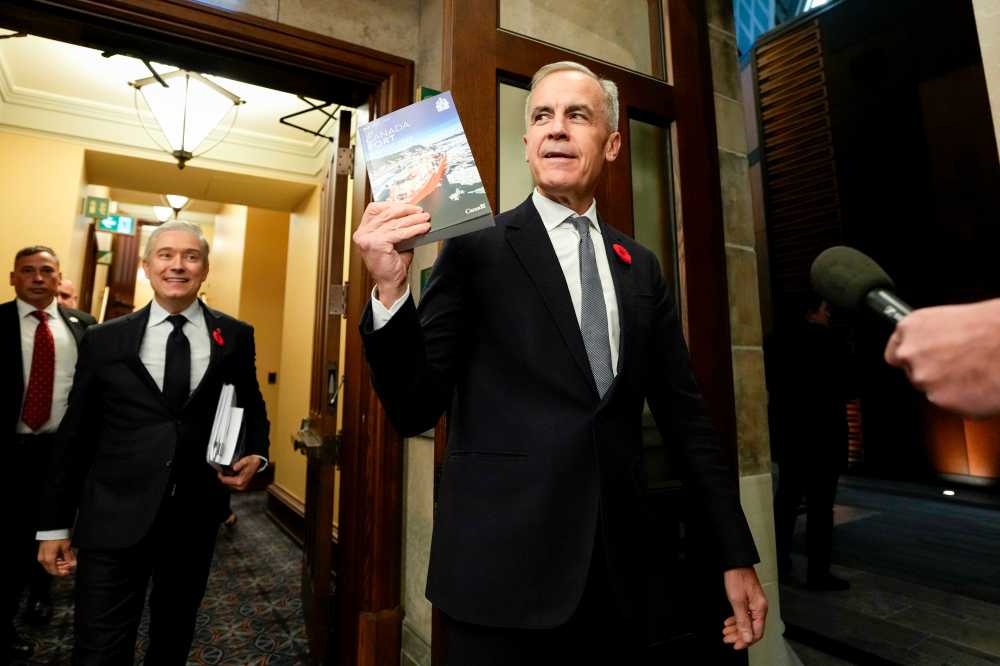A federal budget worth supporting
Advertisement
Read this article for free:
or
Already have an account? Log in here »
We need your support!
Local journalism needs your support!
As we navigate through unprecedented times, our journalists are working harder than ever to bring you the latest local updates to keep you safe and informed.
Now, more than ever, we need your support.
Starting at $15.99 plus taxes every four weeks you can access your Brandon Sun online and full access to all content as it appears on our website.
Subscribe Nowor call circulation directly at (204) 727-0527.
Your pledge helps to ensure we provide the news that matters most to your community!
To continue reading, please subscribe:
Add Brandon Sun access to your Free Press subscription for only an additional
$1 for the first 4 weeks*
*Your next subscription payment will increase by $1.00 and you will be charged $20.00 plus GST for four weeks. After four weeks, your payment will increase to $24.00 plus GST every four weeks.
Read unlimited articles for free today:
or
Already have an account? Log in here »
Budget 2025 — the Carney government’s fiscal plan for the coming year — seeks to “build Canada strong.” Whether the plan is capable of achieving that goal remains to be seen, however, as it will require the Carney government to thread a narrow fiscal needle at a time of significant global financial instability.
Finance Minister François-Philippe Champagne argues it is time for “bold and swift action” to build Canada’s economy for an uncertain future, and his 406-page budget plan certainly includes its fair share of both new spending and spending cuts.
There is almost $90 billion in net new spending over the next five years, a substantial portion of which is designed to protect the nation’s economy and sovereignty in the face of the fiscal turbulence caused by the reckless actions of the Trump administration.

For example, $5 billion is earmarked over the next seven years for a national trade diversification corridor, while an additional $1 billion will be spent over the next four years on Arctic infrastructure. All that spending is largely focused on large-scale national projects that will reduce Canada’s dependency on the U.S. economy, making it easier for Canadian businesses to sell their products and services to other international markets.
Budget 2025 also includes a staggering $73 billion in new spending for Canada’s military — including long-overdue pay raises for our armed forces personnel — with $30 billion allocated toward capital investments.
In order to fund all that new spending, the budget also contains a number of serious spending cuts. After conducting a “comprehensive expenditure review,” the plan sets out a clear goal of spending less on its day-to-day operations. A key component of that reduction is the goal of trimming approximately 40,000 positions from the federal civil service by 2029.
Beyond that significant measure, the government is also cutting spending in many of its departments, while freezing spending in others. Of note, there is also a $2.7-billion cut in foreign aid over the next four years, along with a drastic reduction in new temporary resident admissions from 673,650 in 2025 to 385,000 in 2026.
The number of student visas to be issued in 2026 has also been slashed, from 306,000 under the previous immigration plan to just 155,000 for 2026, and to just 150,000 for 2027 and 2028.
Add up all of the spending and cuts contained in Budget 2025 and you arrive at a projected deficit of $78.3 billion for the current fiscal year, which is more than double the estimate for last year.
Should a deficit that large be a cause for concern? Without doubt, but Canada’s net debt-to-GDP ratio will still continue to be the lowest among G7 nations. And it is doubtful that Canada would be better off with even deeper spending cuts, and without the new economic and defence investments that will be made over the next five years.
The hard reality is that Canada and many other nations each find themselves in an economically precarious position as a consequence of the ill-advised economic policies of the Trump administration. In order to withstand that uncertainty, investments must be made in order to put the nation on a stronger economic footing that is far less vulnerable to the unpredictable rants and ravings of Donald Trump.
Budget 2025 makes those investments, while simultaneously focusing on delivering a leaner, more efficient government for Canadians.
It is a reasonable fiscal plan — a credible first step by a new government and new prime minister — toward addressing the challenges of Canada’s current fiscal reality. It is worthy of Canadians’ support.
